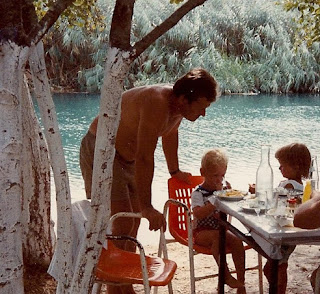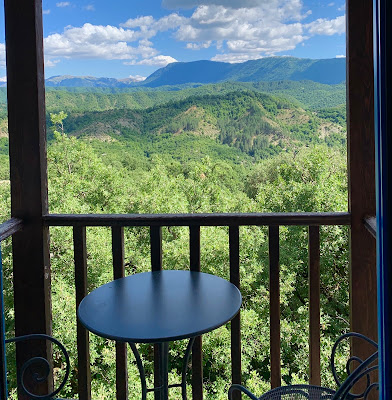Dear Sweet Reader,
This seems to be an appropriate last post --as you can see by the ending of this particular story. We have brought the past into perspective and thus arrived at the present. I thank you dearly for your emails and your kind words regarding the book, The Nifi. I also thank those of you who have reached out on your visits to Greece and I look forward to many more enjoyable conversations with you.
Please enjoy this last post.
With much love,
The road is carved into the side of the mountain. It veers off the main highway from Margariti Village and hugs the coast of the Ionian Sea, giving a spectacular bird’s eye view of the gulf and the coastline to Parga. Suddenly, the road bends into a bit of brush and comes out atop a winding ridge, leaving behind the seacoast while opening into a perfectly formed delta on the left, a delta whose tentacles fan out from the mountain’s edge in perfect unison. It's filled with a labyrinth of water and low lying brush, an estuary humming with unseen life.
From that height, one can follow a line of trees which indicates the River Acheron's pathway as it empties into the sea far across the delta. Sweet water meets salty, a different ecosystem entirely. It's the town and the beach of Ammoudia.
The sea at the shore's edge is shallow for several meters which requires a bit of wading (and waiting) to get to the deeper water. But part of the fun of walking through the shallows and over sandbars is in observing the mixture of people as you become one more ingredient within this village portrait.
Recently, as my husband, Nick, and I were swimming together in the coolness of that blue-green water, a young man pedaled by in an orange pedal boat, a young Nick--the spitting image. Uncanny! And his children. Good Lord! I could barely breathe. They were Nikki and Thomas sitting at the back of the pedal boat, our two little imps, serenely passing us by, their sun-bleached hair matted from salt and sea water. I’d dreamed of a moment such as this, just to have a glimpse back in time. To see it all again with fresh eyes, an older woman's knowledge and a wealth of experience. Oh my, and how handsome he was, that young Nick of mine.
“Look, Nick,” I said to the gray-haired husband treading water beside me, “It’s you as a young man.” I swam away from him and toward the rocky edge of the river jetty where the orange pedal boat seemed to be headed.
What luck to see him and the children, to be given the opportunity to undo what had been done. He pedaled with strength and so quickly. The boat glided further away. I had to warn young Nick, to tell him all the things his overzealous testosterone prevented him from seeing and to warn the children of the bumps ahead. They’d need to be prepared for those years of mine at the university, Nick with a 70-hour work week. Trying to improve our lives . . . though such undertakings had created unimaginable fatigue and an anxious psyche which translated to unkind behavior. A parent’s guilt--the lament of many. Maybe I could make it better this time. I needed to warn them. But that young Nick had a strength I’d forgotten and the orange pedal boat grew smaller.
“Nick!” I yelled to him waving my hands to get his attention. “Wait! Come back!”
“What’s wrong with you, Linda?” the gray-haired Nick was beside me, grabbing my arm, which made it impossible to swim and the orange pedal boat grew even smaller as it continued on.
“It’s you and the kids.” And as I said it, I realized its ridiculousness and my face grew hot as my breath left me.
“Nick.” It was a whisper.
His brows scrunched down in a question but he said nothing.
I felt embarrassed. “He looked like you and the kids.”
“Who?”
I nodded my head toward the orange pedal boat that was now a small square, docking near the jetty rocks. I couldn’t see what young Nick was doing but I heard the deep hum of his voice as he spoke to the kids.
Gray-haired Nick waited and then repeated, “who?”
“The guy on the pedal boat.”
“What guy?”
“The one with--” I swallowed. They were gone. And all that remained were the distant rocks with white splashes of surf against the backdrop of a lime green river bank.
“Such strength,” I thought, “youth and strength.” But I said, “Oh, never mind,” taking in a deep gulp of air as I struggled to stay afloat.
Gray-haired Nick’s forehead remained furrowed as his eyebrows slowly released their tension and he continued to look at me.
“Okay,” he said quietly, “let’s get back to shore. We’ll go for coffee.”
That was our code for let’s go somewhere and talk.
We went to one of our favorite cafes. I suppose we could have walked along the crescent-shaped beach to get there, but instead we packed the car and drove a few minutes on the narrow village-road.
The cafe is really nothing more than a bit of cement with a tarp overhead and some trees. It is the amiable proprietor and his good fortune of cafe placement that keep us returning. The cafe is on the Acheron River near where it empties into the sea. There are several cafes there, but this particular one is placed right at an opportune bend in the river so that if you are lucky enough to get the corner table, you are actually sitting inside the river and the breeze is unending and soothing.
We parked our car several meters from the cafe. Nick decided to go get a newspaper at the kiosk on the next street while I went to secure our favorite table. As I walked over the little bridge that leads to the cafe, my pace slowed as I realized our table was occupied. There sat young Nick with little Nikki and Thomas.
And young Linda.
I approached their table slowly. All sound had ceased. All movement stopped, except for at the rickety table at the corner of the cafe. They must have seen me gawking but it did not appear so. Their light banter seemed playful. What was Nick saying? The children were riveted to every word.
Ah yes, I remembered. He had been our story teller. I’d been the writer, but he’d had all the tales. His voice was strong but gentle. The children hung on every word and when he finished, they all laughed. Young Linda was smiling at her groom with a look I vaguely recalled. The children, they couldn’t have been more than three or four years old, were playing some kind of game with unseen props. Young Linda was speaking tenderly to them. Their heads nodded.
Of course! An old woman’s guilt is built upon faulty memories, upon dwindling time and upon lost chances. I was sitting now, at a table so close, I could reach out and touch them, as I desperately wanted to do. To take each child in my arms, embrace them with the longing that poured from every heartbeat that I felt as my chest heaved with memory.
We’d done a fine job, Nick and I. We were human after all, as faulty as every human. We’d had our moment in time to shape the memories we could, not all of them with whimsical fancy but all with the love and satisfaction I felt at that moment. And there was gray-haired Nick coming across the bridge with a newspaper tucked under his arm. His smile as wide as his heart. He looked straight through young Linda and met my eyes.
“Why aren’t you sitting at the corner table?” he asked? “Quick, before someone else comes along.”
Young Linda nodded in agreement, beckoning me with an outstretched arm. I left my table behind and joined the others at the corner table in the bend of the river.
Here are the links for The Nifi, Your Own Kind, and Among the Zinnias. I hope you'll give one of them a try! And if you'd like to connect, I'd love to hear from you:
authorfagiolikatsiotas@gmail.com




































